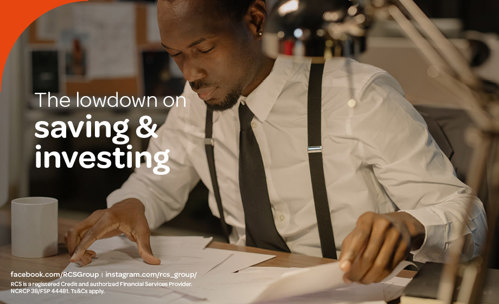The Lowdown On Saving & Investing
16 AUGUST 2023
July is National Savings Month in South Africa, declared by the Savings Institute of South Africa. This month is all about positive financial behaviour and this article will help you get the lowdown on all things Saving and Investing. National Savings Month is to help us as consumers to learn and strive towards living within means. Through research, it is shown that almost 70% of South Africans are not saving, and those that are, are not saving early enough. The South African Savings Institute (SASI) highlighted that household savings were 1.7% while household debt was 75.4% This shows that households in South Africa need to adopt saving and investing habits early, to avoid incurring bad debt.
National Savings Month is to help us as consumers to learn and strive towards living within means. Through research, it is shown that almost 70% of South Africans are not saving, and those that are, are not saving early enough. The South African Savings Institute (SASI) highlighted that household savings were 1.7% while household debt was 75.4% This shows that households in South Africa need to adopt saving and investing habits early, to avoid incurring bad debt.
The difference between saving and investing?
So what differentiates the two? Saving is putting money away that you won’t use until you need it in the case of an emergency or a future financial goal. This money is set aside that you can quickly access it. There are many options available by banks and other financial institutions to help you save money.
Investing consists of buying stocks, bonds, mutual funds, or real estate with the intention that your money will grow over time. These assets increase as time passes and therefore will help you achieve long-term financial goals.
All about saving
Although it may seem a little more difficult to save during the uncertain time we find ourselves in, it’s important to try to save money when and where we can. One method to do this is through a savings account. A saving account allows you to keep your money in a safe place while it earns interest over time. Most accounts need a minimum balance to work and start saving. Your money is insured in a savings account, so it’s safe to put away.
Why should you save? We all have goals and dreams that we want to achieve and sometimes the means to get to them doesn’t always seem easy. With saving, you can put money away to use at a later stage in life when you’re able to take that next step, or when you need to use the money for an emergency. Saving for retirement early on in life will help you set yourself up for life after work. This will ease the worries of not having an income when you can no longer work.
Finding the best savings account for you requires research and comparison on your part to assess all the types of saving accounts available. Depending on how often you’ll be putting away and how much interest you’ll earn.
Read about saving as a young adult, and saving during a pandemic in our other pieces. There are also some things to consider before you spend your savings.
What you need to know about investing
Investing is the best financial tool to help you grow your money without worrying about it. This way your money works for you while you are still busy with life. Investing works by putting money towards or buying stocks, mutual funds or real estate and leaving it there to increase over a period of time through interest. However, there are risks associated with investing, e.g. if stocks or bonds do not earn more than what you have purchased.
In order to invest, you need to first determine your investment goals and then what type of investment you would need. For example, shares are loaning money to a company to grow, or invest in research. Thereafter you sell your shares at a higher price and receive your returns which are what you’ve invested and the growth of the share after time. Another type is a bond which represents money loaned to the bond issuer. Unit trusts are money that is from a lot of investors, invested in a variety of assets to spread the risk.
Learn more about investing and how to invest in our How to Invest Your Money article.
Is saving or investing better?
Depending on what your financial goals are in life and what your financial status is, saving or investing might be the better option for you to reach them. Saving is safer than investing, but may not lead to the same returns over time compared to investing. Know how much risk you’re willing to endure or how much you can put away each month. Try your best to save where you can and educate yourself on investing or speak to a professional to learn more.



